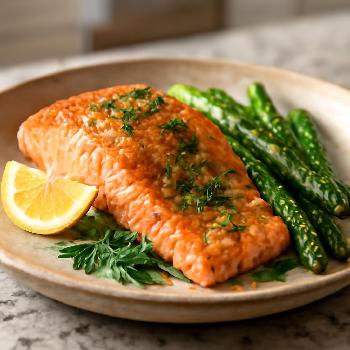Healthy & Special Diets > Recipes for Weight Management > High-Satiety Recipes > Dinners with Satisfying Protein and Vegetables
Lemon Herb Baked Salmon with Asparagus
A simple and delicious baked salmon recipe, packed with protein and healthy fats, served with tender asparagus. This dish is perfect for weight management due to its high satiety and low carbohydrate content.

Ingredients
- 2 Salmon fillets
- 500 g Asparagus spears
- 1 Lemon
- 2 tablespoons, chopped Fresh dill
- 2 tablespoons, chopped Fresh parsley
- 2 tablespoons Olive oil
- 2 cloves, minced Garlic
- To taste Salt
- To taste Black pepper
Preparation
Preheat your oven to 200°C (400°F). Line a baking sheet with parchment paper.
Prepare the Asparagus
Wash the asparagus and trim the tough ends. Place them on the prepared baking sheet.
Season the Asparagus
Drizzle 1 tablespoon of olive oil over the asparagus. Season with salt and pepper. Toss to coat evenly.
Prepare the Salmon
Place the salmon fillets on the same baking sheet, next to the asparagus.
Make the Lemon Herb Mixture
In a small bowl, combine the minced garlic, chopped dill, chopped parsley, juice of half a lemon, and the remaining 1 tablespoon of olive oil. Mix well.
Season the Salmon
Spoon the lemon herb mixture over the salmon fillets. Season with salt and pepper. Slice the remaining half of the lemon and place a slice or two on top of each salmon fillet.
Bake
Bake in the preheated oven for 15-20 minutes, or until the salmon is cooked through and the asparagus is tender. The internal temperature of the salmon should reach 63°C (145°F).
Serve
Remove from the oven and serve immediately. Garnish with extra fresh herbs or a lemon wedge, if desired.
Nutrition Facts Estimated per 100g of product
Calories: Approximately 150-180 kcal Protein: 18-22g Fat: 7-10g (mostly healthy fats from salmon) Carbohydrates: 2-4g Fiber: 1-2g Note: These values are estimates and may vary based on specific ingredients and portion sizes.
Other Important Considerations for Nutrition
This recipe is naturally gluten-free and low in carbohydrates, making it suitable for various dietary needs. It's a good source of omega-3 fatty acids, vitamins, and minerals. To further reduce calories, you can use a smaller amount of olive oil or opt for a cooking spray. The high protein content of salmon and fiber from asparagus contribute to satiety, helping to manage hunger and support weight management goals.
FAQ
-
Can I use frozen asparagus for this recipe?
Yes, you can use frozen asparagus. Just make sure to thaw it before baking. You may need to adjust the cooking time slightly. -
Can I substitute the salmon with another type of fish?
Yes, you can substitute salmon with another fatty fish like trout or mackerel. The cooking time may vary depending on the thickness of the fillet. -
How do I know when the salmon is cooked?
The salmon is cooked when it flakes easily with a fork and the internal temperature reaches 63°C (145°F).
